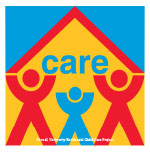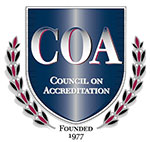PROGRAMS
GET INVOLVED
SUPPORT OUR MISSION

There are a wide range of circumstances that can leave older adults in charge of their grandchildren’s care. Whether the situation was sudden or gradual, older adults who are thrust into the position of the sole provider/caregiver for young relatives may feel lost or overwhelmed. Fortunately, there are many different resources to help the 100,000-plus grandparents who find themselves taking care of children, long after expected.
Here are some helpful tips and information to guide grandparents through kinship care:
Prepare for shifting roles
There are many logistical preparations grandparents should make before assuming the role of a primary guardian, but perhaps the greatest thing to be prepared for is a shift in the relationship. The traditional grandparent-grandchild relationship often consists of weekend visits, holiday events, and interactions may largely be centered around play, however, the requirements of daily care can cause the relationship dynamic between grandparents and grandchildren to change.
Regardless of how this relationship shifts, grandparents and their grandchildren can enjoy a beautifully close relationship with one another. If either the older adult or child (or both parties) seem to be having a difficult time with the change in parental roles or living situations, Hoyleton Youth and Family Services offer supportive counseling services that can help with any adjustment anxiety.
Gather support where you can
Even the most fiscally responsible older adults, sometimes struggle to afford the daily necessities of life. According to the U.S. Census Bureau’s Supplemental Poverty Measure, which takes additional factors such as geographical location and homeownership status into account, as many as 7.2 million U.S. seniors lived in poverty in 2017. Coupled with the issue of food insecurity, which is most prevalent across senior populations, the added responsibility of a younger relative can be financially burdensome. In fact, the SNAP program (commonly referred to as “food stamps”) reports that almost one in five seniors living with grandchildren is food insecure, yet three in five seniors who qualify for the SNAP program don’t participate.
Whether needing assistance with paying for food, rent, medical insurance or other daily needs, older adults can seek out the various benefits they may be eligible for with this helpful, Benefits Check Up tool and with the Illinois Department of Family Services’ list of useful resources, specific to older adults caring for a child.
Support the child through difficult times
Just because an older adult is the legal guardian of a grandchild doesn’t mean the child’s parent is out of the picture. If possible and in the best interest of the child, share information about the child’s life with parents, including their school activities, hobbies, and life milestones or events. Establish a routine for visits and schedule in advance, to ensure that everyone is comfortable and on the same page about the visit, especially the child.
Regardless of the potentially frustrating circumstances that led to a child living with a grandparent or other older relative, it’s critical that grandparents do their best not to speak negatively about the parent in front of the child and to not make them feel guilty for wanting to spend time with their parent, as it can be confusing and upsetting to them. Instead, older adults should try to get a sense of how the child feels about their parent(s), and ease any uncertainties, anxieties or disappointments surrounding visits.
There’s no foolproof plan for raising children, especially for older adults who likely thought their child-rearing days were far behind them, however, this information can help support older adults as they navigate this unique journey.


